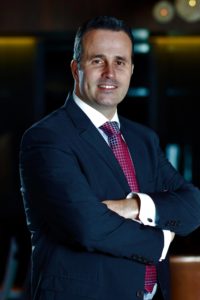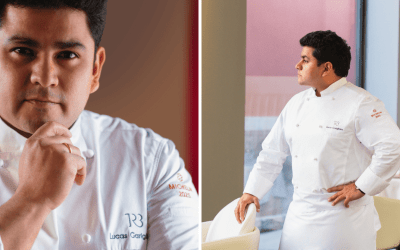Manuel Santos graduated from EHTP, School of Hospitality and Tourism of Porto, with a degree in Hotel Management in 1997 and has been working in hospitality ever since, with no regrets. Here he talks about his journey, his motivation, and the ways in which diving into this industry has changed his personal and professional life for the better.
Why are you in hospitality, and why have you stayed in hospitality so long?
I grew up in Porto, which, back in the 80s and 90s, was not very strong in hospitality in hotels. I was studying management and finance in high school, but I didn't see myself as someone who would work in a bank or some kind of a financial institution, because I've always enjoyed being with people, traveling, and surfing. I wanted to find something that could help me travel the world and still use my financial and management expertise. The mother of one of my best friends, she felt guilty, because she had traveled and been in many five star hotels all over the world. And she said, there's a hospitality school in Porto, and it's quite a good one. So, I did a bit of research, and the school – EHTP, the School of Hospitality Management of Porto – had been open at that time for around two and a half decades – we're talking 1993 or so. It had quite a good reputation. I started researching a little bit, and I was like: well, this sounds interesting, and I think I could apply the things I do and I love, and at the same time discover the world. So I applied. There were 350 applications for 50 entries, and I was lucky to get in at number five. So, that was a good sign, I think.
I joined and did Hospitality Management. I did my two internships in Algarve, and that was my first real interaction with international guests, different cultures, everything you can possibly imagine. I worked in Shelton Pine Cliffs, which was a luxury collection – but back then that didn't exist, it was much simpler in terms of hotel rooms. Then I did an MIT program in a Portuguese company, and afterwards went to work in Orient Express hotels, which is now Belmont in Lisbon, for three years. I gained the confidence to travel to London without a job and start working as a waiter. From that moment onwards, I just kept going and traveling.
Hospitality is a unique segment of business, because you are dealing with people, which for some people is very difficult. Others are naturally passionate about it, and I think I am one of those. I love to learn about culture. I've learned about different ways of thinking, languages; I speak four languages fluently, but I speak a few more, little bits and pieces. I see the world as a big movie, a big series of chapters. Nowadays, you have Netflix with all those chapters, with all the different chefs. I started doing that myself, because there was no Netflix back then. Hospitality has given me that experience in life. During my career, I also managed to meet my wife, who’s from Belgium, and we met in Dubai in 2004. We have three children, who have been all over the world. If you ask them where they’re from, they have no idea, but they’re happy. It was the best choice I’ve made in my life.
Did you know that you could build an international career? The first bold move that you made to jump to London was really brave.
First, I went without a job. I just started working as a waiter in the Cumberland Hotel. That's not on my CV, because it's irrelevant. I arrived in London absolutely jobless, with no place to stay. The only hotel that was offering accommodation was the Cumberland in Marble Arch. So, I started working there. But I understand what you're asking. This is a question that I get asked often.
I can give you my two cents that has worked for me. It's very difficult, because there's a lot of competition in our industry. On the other hand, there are also more opportunities, because there are new hotel chains, new products that actually adapt a lot more to our ideals. In my time, there was one set of standards and all the hotels were pretty much the same. You either adapt, or you’re out. Nowadays you have lifestyle art connected to fashion, connected to music. You have more options, more destinations, to choose from. I knew from the beginning that it was a tough market. It's tough competition. So, I always set in my mind, wherever I am, whatever I'm doing, I need to be either number one or number two. And that means not competing with others, but competing with myself every day. I would always look at the people that were the top winners, in performance, in results, the ones that came really well prepared for the meetings, that had great presentations, that did a lot of things with their teams. I learned from them, and I tried to become better than them and better than myself. I researched a lot. I read a lot. I did a lot of training on people management, time management, and leadership. People say you don't have to change your leadership style every time you read a new book. That's true. You have to find what works for you, but from every single book you read, you will capture something that makes sense to you. You try it; it works – good. You do it.
So there was a lot of hard work. There were many days of 12, 14 hours because I chose to work those hours, because no one asked me. Many weekends, too. The first decade of my career, I dedicated myself entirely to my career. I put my personal life a little bit on the side, always having fun, of course – work hard, party hard – but, but my goals were really career driven, career focused. I developed myself a lot. I did every single training.
I had some mentors. One came in in 2010, in Abu Dhabi; he was the general manager of the property where I worked. He's still my mentor to this day. It's difficult to find good mentors, because good mentors are not the people that tell you what you want to hear. They’re actually the people who tell you what you don't want to hear, and it's really hard. That's when you know they’re good, because they will tell you whatever they think, and the hard truth is the best for you, too.
I’ve always worked like that, and I'm a very driven person. I don't wait for people to tell me what to do, or to ask me what my next goal will be. When I go into a property, I look at the market; I try to find out who is number one. Why are they number one? Can we replicate their success? Can we improve beyond their success? We can't? Can we look at other angles and still be successful? I analyse things a lot, and then I try. If it doesn't work, it's fine, I try something else. But I keep trying until I win. That's it; there's nothing else. One of the things I always ask in interviews with people is: what drives you to join this business? When people use the word passion, boom – the number one ingredient. Also, they have to have some kind of a personality or charisma, because no matter what people say, there's no worse thing than a host – and hoteliers, we have to be hosts – without a personality or charisma. If you don't have it, work on it. But don't expect to be like an accountant doing charts and be successful in hospitality because that doesn't happen – in my opinion, of course,

What makes someone or something stand out to be number one?
In an organization, when you join, you always hear, the flagship hotel is that; the best director is that; the most creative person in the company is that; and the one who has the best results is that. So, immediately when you join an organization, you want to know who the key people are that people talk about. Then you peel the onion, right? You start understanding why – what makes other people talk about them? Is it the result? Maybe they launched a successful concept, etc. Then you have to position yourself to be in their league – and that takes time, and it also takes courage and strategy. In terms of competitors, usually you have to know who your competitor set is. There’s no use in comparing yourself with someone who is out of your competitor set, because that's doomed for failure. You have your competitor set with 4 or 5 hotels, 5 or 6 restaurants, depending on what you're talking about. Then you ask, why is this number one on your set? How does it get, if we're talking about rooms, that rate, or why does the restaurant have better ratings on TripAdvisor? There're so many things you can compare. Then, you need to work on all these indicators to become better than the others.
How would you help someone who’s leaving university, help them find that big vision inside themselves?
I think the first thing to do is, when you finish university, for the first few years, don't worry too much about your position. The first three to four years, try to work in as many different places in the world that you can, key cities: London, New York, Tokyo, Singapore, Dubai. So, if you have the opportunity, go, travel. Wherever you live, research. Don't waste your time doing things that are not going to add value to your career in your life. So, if you go and eat lunch, try to go and eat lunch somewhere else every single time, different cuisines. I learned a lot from the most rustic places – not necessarily the most luxurious places. When you look for authentic good food, you need to go to those little restaurants, the little stalls from some old people who are cooking it. Talk to them, and they will teach you what's good as well. So: travel, experience, visit. Our brains are like sponges: absorb. I learn a lot as well via social media. I follow a lot of influencers. I follow some of the top chefs in the world, some of the top bars, some of the top hotels, all the really good publications, Conde Naste, etc. They all have social media as well. Follow these guys; always stay in sync with what's going on. Start absorbing, and then your brain, at a certain point, will start putting all these things together. You will start using your own ideas and creativity with all the information that you have absorbed in the first years of your career. That's all I've done; I've seen everything that I could, tried to see as much as I could. Every time I went somewhere in the beginning, in the 90s, I bought a guide and looked at the guide – then I went to this restaurant, to that bar, and I visited this thing. Later on, with the Internet, it became much easier. I use Culture Trip a lot – not trying to be an ad because they don't pay me anything – but I love the app. It's fantastic. It gives you a little edge on things to do.




